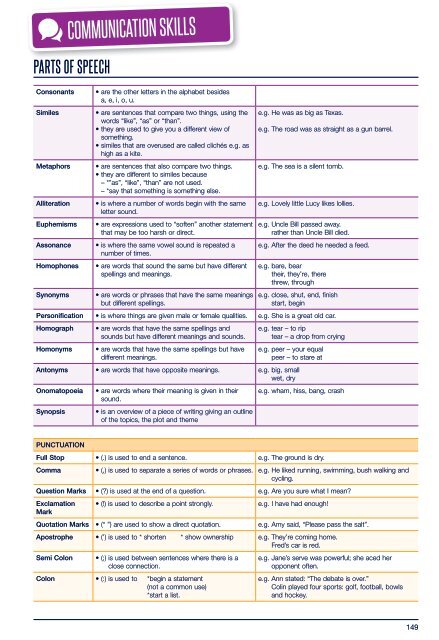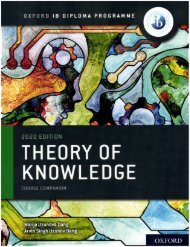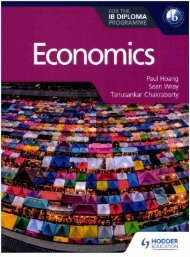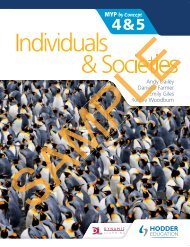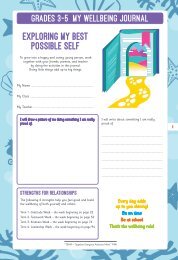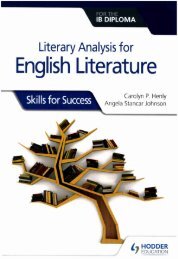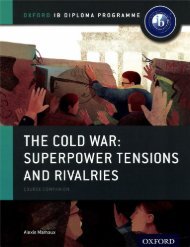2019-20 N. American Planner_DP Sample
You also want an ePaper? Increase the reach of your titles
YUMPU automatically turns print PDFs into web optimized ePapers that Google loves.
COMMUNICATION SKILLS<br />
PARTS OF SPEECH<br />
Consonants<br />
Similes<br />
Metaphors<br />
Alliteration<br />
Euphemisms<br />
Assonance<br />
Homophones<br />
Synonyms<br />
• are the other letters in the alphabet besides<br />
a, e, i, o, u.<br />
• are sentences that compare two things, using the<br />
words “like”, “as” or “than”.<br />
• they are used to give you a different view of<br />
something.<br />
• similes that are overused are called clichés e.g. as<br />
high as a kite.<br />
• are sentences that also compare two things.<br />
• they are different to similes because<br />
– *”as”, “like”, “than” are not used.<br />
– *say that something is something else.<br />
• is where a number of words begin with the same<br />
letter sound.<br />
• are expressions used to “soften” another statement<br />
that may be too harsh or direct.<br />
• is where the same vowel sound is repeated a<br />
number of times.<br />
• are words that sound the same but have different<br />
spellings and meanings.<br />
• are words or phrases that have the same meanings<br />
but different spellings.<br />
e.g. He was as big as Texas.<br />
e.g. The road was as straight as a gun barrel.<br />
e.g. The sea is a silent tomb.<br />
e.g. Lovely little Lucy likes lollies.<br />
e.g. Uncle Bill passed away.<br />
rather than Uncle Bill died.<br />
e.g. After the deed he needed a feed.<br />
e.g. bare, bear<br />
their, they’re, there<br />
threw, through<br />
e.g. close, shut, end, finish<br />
start, begin<br />
Personification • is where things are given male or female qualities. e.g. She is a great old car.<br />
Homograph<br />
Homonyms<br />
• are words that have the same spellings and<br />
sounds but have different meanings and sounds.<br />
• are words that have the same spellings but have<br />
different meanings.<br />
e.g. tear – to rip<br />
tear – a drop from crying<br />
e.g. peer – your equal<br />
peer – to stare at<br />
Antonyms • are words that have opposite meanings. e.g. big, small<br />
wet, dry<br />
Onomatopoeia<br />
Synopsis<br />
• are words where their meaning is given in their<br />
sound.<br />
• is an overview of a piece of writing giving an outline<br />
of the topics, the plot and theme<br />
e.g. wham, hiss, bang, crash<br />
PUNCTUATION<br />
Full Stop • (.) is used to end a sentence. e.g. The ground is dry.<br />
Comma • (,) is used to separate a series of words or phrases. e.g. He liked running, swimming, bush walking and<br />
cycling.<br />
Question Marks • (?) is used at the end of a question. e.g. Are you sure what I mean?<br />
Exclamation<br />
Mark<br />
• (!) is used to describe a point strongly.<br />
e.g. I have had enough!<br />
Quotation Marks • (“ ”) are used to show a direct quotation. e.g. Amy said, “Please pass the salt”.<br />
Apostrophe • (’) is used to * shorten * show ownership e.g. They’re coming home.<br />
Fred’s car is red.<br />
Semi Colon<br />
• (;) is used between sentences where there is a<br />
close connection.<br />
Colon • (:) is used to *begin a statement<br />
(not a common use)<br />
*start a list.<br />
e.g. Jane’s serve was powerful; she aced her<br />
opponent often.<br />
e.g. Ann stated: “The debate is over.”<br />
Colin played four sports: golf, football, bowls<br />
and hockey.<br />
149<br />
<strong>20</strong>18/19 Intl <strong>Planner</strong>_<strong>DP</strong>_REAR.indd 149 25/5/18 3:14 pm


